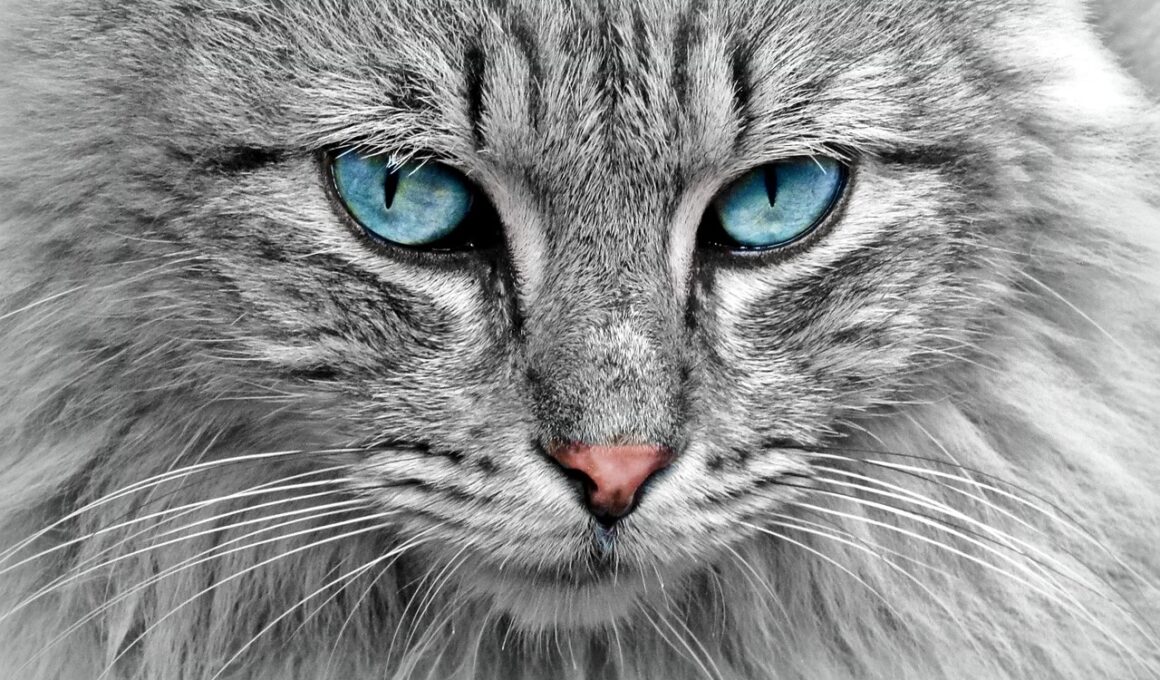Identifying Early Signs of Kidney Disease in Adopted Cats
Kidney disease is a serious condition that can affect our beloved adopted cats. Identifying the early signs of this disease is crucial for prompt intervention and treatment. Cats often show subtle symptoms that may be overlooked, leading to advanced stages of the condition. Monitoring changes in your cat’s behavior or routine can help catch potential problems early. One of the first signs includes increased thirst and urination, as a cat’s kidneys struggle to filter fluids properly. You may also notice your cat eating less or showing signs of weight loss. Additionally, keep an eye out for lethargy; your once playful cat may seem tired and disinterested. If your cat is grooming less and developing a poor coat condition, it’s time to consult a veterinarian. Periodic veterinary check-ups can help monitor kidney function through blood tests. Diet plays a critical role in kidney health, and your vet can recommend specific foods tailored for kidney support. By taking these early signs seriously, you can ensure your furry friend receives the best care possible. Always prioritize your cat’s comfort and well-being in their journey with you.
Once you adopt a cat, your responsibility extends beyond providing food and shelter. Educating yourself about common feline diseases, including kidney disease, enhances your ability to care for your pet effectively. Regular veterinary visits are essential for maintaining your cat’s health and catching potential issues early. Kidney disease affects older cats predominantly, but younger cats can also be affected due to genetics or other factors. Watch for changes in urine color; darker urine might indicate an underlying issue. Also, pay attention to their appetite; sudden changes can signal health complications. Another critical sign of kidney disease is frequent vomiting, which can lead to dehydration and further complications. Observe how your cat interacts with other pets; isolating themselves may indicate a problem. Essential to kidney health is ensuring your cat has constant access to clean water. Hydration supports kidney function, helping to flush toxins out of their system. By being proactive in your cat’s care, you can enhance their quality of life and longevity. If you observe any signs of distress or health changes, consult a veterinarian immediately for diagnosis and treatment.
Understanding Kidney Health in Cats
Understanding the anatomy and function of a cat’s kidneys is vital in recognizing kidney disease. The kidneys filter waste and excess substances from the bloodstream, regulating fluid levels in cats. When kidney function declines, toxins can build up, resulting in various health issues. Regular monitoring can help detect kidney issues before they become critical. As such, it’s wise to be familiar with dietary choices. Cats on a balanced, nutritious diet are less likely to develop kidney disease. Look for foods that promote renal health, with reduced phosphorus and protein levels, to alleviate strain on the kidneys. Your vet can recommend ideal brands and types suitable for your cat. Additionally, maintaining a healthy weight is important; obesity can contribute to various health problems, including kidney disease. A lifestyle that encourages active play keeps your cat physically fit. Ensure your home environment is conducive to exercise, providing toys and climbing spaces. Adopting measures to enhance kidney health can significantly improve your cat’s well-being. Ultimately, staying informed about kidney health empowers you to make the best choices for your furry friend.
Good hydration is essential for your cat’s kidney health. Cats often require at least 2-4 ounces of water daily, but actual needs may vary based on size and activity. You can encourage your cat to drink more by providing fresh, clean water at all times. Additionally, consider using a water fountain, which attracts cats and encourages them to stay hydrated. Wet cat food is another excellent option, as it contains additional moisture. This added water intake can significantly impact kidney health over time. Observe your cat’s drinking habits; if they suddenly start drinking more or less, it could indicate a problem. Monitor their litter box; an increase in urine output may suggest kidney issues. Another aspect to consider is dental health, as poor oral hygiene can lead to systemic problems affecting the kidneys. Regular dental check-ups and cleanings can prevent complications that jeopardize your cat’s health. Keeping your cat’s environment stress-free is also crucial; stress can contribute to health issues, including kidney disease. Your veterinarian can provide valuable guidance on maintaining optimal kidney function for your adopted pet.
The Importance of Regular Veterinary Check-ups
Regular veterinary check-ups are paramount in ensuring your adopted cat’s long-term health and wellness. During these visits, vets often perform routine blood work to monitor kidney function and screen for potential issues. Early detection of kidney problems allows for prompt intervention, which may include dietary changes or medication. Furthermore, routine exams can catch other common feline diseases that may accompany kidney issues. Cats typically hide symptoms well; by the time they show obvious signs, the disease might be advanced. This is why proactive healthcare is vital. In addition to blood tests, your vet may also assess your cat’s overall condition with physical examinations, focusing on weight, hydration status, and coat quality. These assessments can provide essential insights into your cat’s health. Ensure that your veterinarian has a complete medical history of your cat to tailor recommendations accordingly. You should also ask them about vaccinations and preventive care strategies to ensure your cat stays healthy throughout its life. Establishing a close relationship with your veterinarian benefits you and your furry companion, leading to optimal health and a long, happy life together.
Incorporating supplements into your cat’s diet may also benefit kidney function. Consult your vet for recommendations on beneficial supplements that can promote renal health. Omega-3 fatty acids, for example, are known for their anti-inflammatory properties and potential kidney support. Adding these to meals could help your cat maintain their comfort and health. Each cat is unique, so consider nutritional needs when adding supplements to their diet. Monitor your adopted cat closely for any changes, as adjustments may be necessary based on individual responses. Emphasize stress management within your cat’s life, as stress can exacerbate health issues. Creating a safe space in your home for them to retreat when feeling overwhelmed can help. Gentle interactions, consistent routines, and engaging activities can promote a sense of security. Also, avoid sudden changes in their environment that might cause unnecessary stress. Observing your cat for behavioral changes is essential; they may indicate underlying health problems, including potential kidney issues. Ensure both mental and physical stimulation are part of their daily routine, providing enrichment that keeps them active and engaged. By focusing on their well-being, you’ll significantly improve their quality of life.
Final Thoughts on Kidney Disease Awareness
Awareness of kidney disease signs can improve your adopted cat’s longevity and life quality. It is essential to guard against kidney problems that may arise unexpectedly. Pay special attention to subtle changes in behavior, dietary habits, and physical health. Early intervention is crucial; if you witness even slight signs, do not hesitate to schedule a veterinary appointment. Education about cat health, particularly regarding kidney disease, can empower you to make informed decisions for your pet. Sharing knowledge with fellow cat owners enhances community awareness, leading to healthier felines overall. Remember that every cat is unique, and genetics may play a role in health issues, including kidney disease. By committing to a trustworthy veterinarian and taking their recommendations seriously, you are giving your adopted cat the best chance at a long, healthy life. Regular screenings for kidney function are an investment in their happiness and wellness. Lastly, provide a nurturing environment filled with love and care, as this contributes immensely to overall health. With proper attention, your adopted cat can thrive, helping you build lasting memories together.
Connecting with local shelters or pet organizations can provide even more valuable resources. These organizations often host workshops and events focused on pet health, offering insights into issues like kidney disease. Targeted educational programs can equip you with tools to support your cat as they age. Finding a community of fellow cat owners allows shared experiences and advice regarding kidney health. You also might discover stories of hope and recovery that inspire you in your journey. As you navigate the complexities of pet care, remember that you’re not alone. Each cat deserves a loving home where their health is prioritized. Gather all the resources at your disposal to ensure your adopted cat lives its fullest life. You can make a difference in their health and happiness. From nutrition to wellness care, every step counts. Additionally, conducting research online can broaden your understanding of nutrition, health, and wellness for cats. Reliable websites and forums focused on feline health can provide insights and tips. Lastly, keep advocating for your cat’s health, ensuring they get the best possible care and attention throughout their life.


